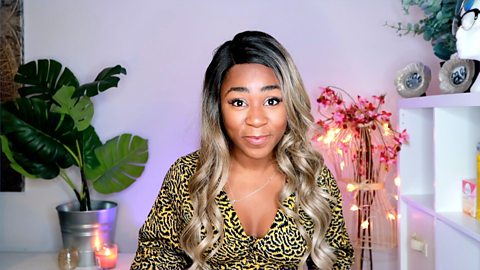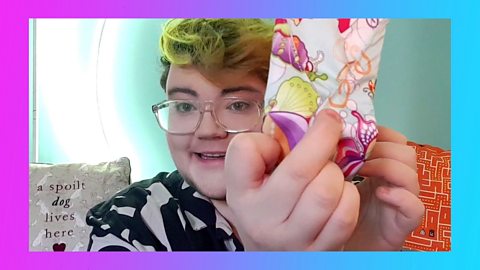Euella Jackson and young people from across the UK discuss the variety of experiences and misconceptions around periods and the menstrual cycle.
These films are suitable for teaching:
- Relationships and Sex Education (RSE) and Health Education at KS3 and GCSE in England
- The Curriculum for Excellence (Health & Wellbeing Education) at National 4 and 5 in Scotland
- Learning for Life and Work at KS3 and GCSE in Northern Ireland
- Personal and Social Education (PSE) at KS3 and GCSE in Wales
Your students might also be interested to watch Let's Talk About Periods: A Newsround Special, in which Lauren Layfield meets experts, celebrities and children to find out what periods are, people's attitudes towards them and why it's important to open up the conversation.
Teacher Vicki Wilson shares the learnings of Stirling High School as the UK pilot school for rolling out free period products
VICKI WILSON:
Stirling Council put together a group to discuss how we would possibly look at rolling out, giving access to sanitary products in schools. So I was part of that group and from that, I volunteered to be the pilot for secondary schools.
Right at the start of the journey we created a survey. From that we found out that 16 percent of pupils who responded to the surveyhad had difficulties in accessing period products.
50 percent said they felt uncomfortable buying sanitary products. 30 percent were uncomfortable talking about periods and thatcovered both discussing it with parents and people at home and discussing it with their peers as well. And we used the informationfrom there in order to plan how we were going to take it forward in the school.
So once we had all the information together, the next thing I did was I asked for indications of interest from the pupils if they wanted to join a pupil leadership group.
We wanted to have a mascot. That was a key thing for me, because I think if he can make any initiative that you're bringing into school, if you can make it fun, people are far more likely to buy into it. And we did discuss lots of different mascots when we wantedsomething that was, that made it acceptable and was something comfortable for pupils to be around. So we ended up with ourmascot who's Pedro the panda.
We had posters up, we had the QR code so that they could do the survey, so we could find out their views. We also had informationthat went out at PSE time, so things were raised in front of pupils. There was information out on the pupil bulletin, so, you know, itwould be quite hard to be in this school and not know that there's products available.
When we started the pilot we had two drawer units in the main bathrooms, we had small baskets of products in all of the PE changing room toilets. We also had a number of staff who volunteered to have a box of products in their room. Obviously, we are aware of some pupils who have more challenging circumstances at home, perhaps financial challenges or social challenges that mean they need products. So, for a lot of those pupils when you're maybe having a conversation with them about something else you'll maybe say "Do you need any products or anything to take home?"
So, over the school holidays, we make sure there's lots of products available in all the areas. We have a table set out and we have asign that we put out this says "Don't forget the holiday period" and then pupils can take away boxes of pads as much as they need and we have also made up little packs that they can take away that contain enough pads and things like that for one period.
Making it a whole school thing. When we had the initial roll out of the products, there was a great buzz in the school. A lot of staffmembers reported that, you know, when they were putting up the panda posters and they were all around the school, that a lot of theboys were saying "What's this all about?" you know, it was opening up conversations about periods. We did get actual anecdotes infrom parents saying that for the first time periods were a topic of dinner conversation. That their daughters were saying what washappening in school and it was starting a family conversation about periods.
One of the other things we did to try and get pupils to engage with taking the product was in the unit we also had a drawer at the top.And what we did was we made available other products that pupils might need, so it wasn't just seen as drawers that were available for sanitary products.
Responsible use, making sure that the products are not wasted making sure that they're not thrown around the school and it's notturned into some sort of big joke. Another thing that we were aware of is we didn't want to put products everywhere and thennobody touch them. So in terms of the responsible use, it was about bringing the pupils on board. We had a junior and a senior panda posse. I had a group of really enthusiastic senior girls and if you're organising in your school, having a really strong pupil leadership team who are not afraid to stand there and hand things out and are comfortable about it and comfortable talking about it will make a huge difference in how it is received by your junior pupils.
After the pilot 91 percent of pupils said they found it easier now to talk about periods and 75 percent had accessed the products, sothat was a huge change for us and you could see that in the way that pupils were having conversations about periods, you would hear them sitting the their friendship groups.
First of all, make sure that the person that you've got who's going to take it forward from the staff is quite enthusiastic about it. Thesecond thing would be to make sure that you've got pupils involved, so that made a huge difference. And the third thing is to make it fun and also making sure that you're not just focusing on this is something that is purely for those who identify as female in the school that it is a broader issue. Everyone has somebody in their life who has periods and the more we can promote that understanding it makes a huge difference.
What is a period? video
Young people from across the UK talk about what they know (and don't know) about periods, while Euella Jackson puts the record straight.

Just say the word. video
Young people from across the UK talk about their experiences of shame and embarrassment around periods. Euella Jackson examines the consequences and promotes open conversation.

How it feels. video
Young people share their experiences of the effects of the menstrual cycle, whilst Euella Jackson offers information and advice on PMS.

Where next?
Mimi on a Mission: Sex Ed. collection
Documentary series following YouTuber Mimi Missfit as she takes seven teenagers to Holland to find out how they teach relationships and sex education.

Bitesize
Use these Bitesize resources to set homework, independent study tasks or to consolidate learning for your pupils.

Newsround
The latest news stories from Newsround to share in the classroom.
